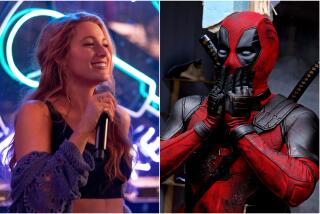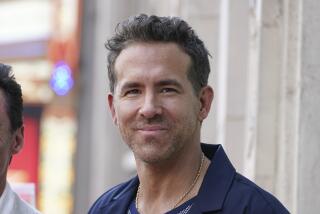Review: Ryan Reynolds’ ‘Deadpool’ mutant gets off to a fun start but eventually wears out his welcome
“Deadpool,” the latest Marvel creation to get his own major motion picture, is very much like a character you might encounter at a party or sit next to on a plane. But not necessarily in a good way.
At first it all seems promising. Energetically played by Ryan Reynolds, Deadpool may be a mutant, but he has no use for his goody-two-shoes X-Men colleagues. A sharp, sarcastic torrent of profane comic energy, he’s an unapologetic breaker of fourth walls who cracks wise to the audience and proclaims, “I may be super, but I’m no hero.” What’s not to like?
See more of Entertainment’s top stories on Facebook >>
You’re initially jazzed by his effrontery, but Deadpool, with his relentlessly glib, nothing-sacred attitude, is not an individual who wears particularly well. Despite everyone’s good intentions, watching him in action makes you feel like Mickey Mouse in “The Sorcerer’s Apprentice,” desperate for the off switch that is not there.
And even though having a Marvel character who curses energetically and engages in vivid sex initially seems refreshingly different, this film’s iconoclasm is all on the surface, a plausible disguise for a movie trying to pretend to be something it’s not.
For though this is the rare Marvel film that is rated R, “Deadpool” is also rife with standard-issue elements like a massive action set piece ending, the mandatory Stan Lee cameo and a central plot question — will love conquer all? — that’s as square as Captain America.
As written by Rhett Reese and Paul Wernick, and directed by Tim Miller in his debut, “Deadpool” packs a lot of its originality, visually and verbally, into an opening sequence that could easily be seen more than once.
Instead of the conventional opening credits, Reese and Wernick come up with a stream of tongue-in-cheek items, with on-screen type bombastically proclaiming “directed by an overpaid tool” and “written by the real heroes here.”
Placed underneath the type by Miller (who has a background in commercials, games and visual effects) is a chaotic action moment pulled out of the middle of the film and presented in super-slow motion, slow enough for us to see, among other things, a tongue-in-cheek visual reference to Reynolds’ previous comic-book incarnation as the unfortunate Green Lantern.

Kenneth Turan reviews ‘Deadpool’ starring Ryan Reynolds, Morena Baccarin, and T. J. Miller. Video by Jason H. Neubert
Reynolds is on much firmer ground here as the antihero Deadpool, someone who calls a poundage-challenged bearded biker “fat Gandalf,” jokes about the sexual habits of Wolverine and says of himself, “I want to live to 102 and die. Like the city of Detroit.”
This act does, as noted, eventually get wearing, but Reynolds is quite good at it. So much so that, as screenwriter Reese explains in the media notes, if the actor said of a line, “I don’t think that sounds like Deadpool,” the writers would take it as gospel.
Though the filmmakers have broken up “Deadpool’s” narrative in a complicated way, taking us back and forth between the past and the present, at its core this is one of those Marvel origins stories. So, eventually, we work our way to two years before the events in the opening montage, before the mutant known as Deadpool existed and Wade Wilson was making his way in the world.
A former Special Forces operative credited with 41 confirmed kills, Wilson as a civilian passes the time as a mercenary working out of a bar called Sister Margaret’s Home for Wayward Girls, an enforcer who sees himself as “a bad guy who gets to ... worse guys.”
Quite literally a wayward girl is hooker Vanessa Carlysle (Morena Baccarin). The two meet cute, go on a date centered on Skeeball and sex, and are as happy as two good-looking movie stars can be until tragedy in the form of a terrible illness strikes.
That puts Wilson in the hands of the evil sadistic Ajax (Ed Skrein), who runs the unsavory WeaponX workshop that aims to create mutants by torturing them until the mutant genes that may be lurking in their DNA appear, an unpleasant experience for the audience as well as the hero.
The result is Deadpool, a mutant with speeded-up healing powers but also a man whose entire body, including his face, has been scarred by the experience. (Though the disfiguring is referred to as “the stuff of nightmares,” in movie terms, not surprisingly, it is fairly easy to take.)
Still, unwilling to show himself to Vanessa, Deadpool goes on a violent rampage to find and punish Ajax and his colleague Angel Dust (MMA fighter Gina Carano). This attracts the attention of fellow mutants Negasonic Teenage Warhead (Brianna Hildebrand) and the computer-generated Colossus, who also get into the act.
Despite all these macho heroics, “Deadpool’s” romantic element turns out to be one of its most affecting. Special mention should go to Baccarin, who seems to specialize in difficult relationships. (She played Nicholas Brody’s wife in “Homeland.”) Her work helps us invest in these proceedings more than one would have thought possible.
ALSO:
‘Deadpool’s’ ‘comic relief,’ T.J. Miller, didn’t really get the joke at first
Ryan Reynolds, sexiest dad alive, gushes about baby daughter James
‘Deadpool’ sketches in Comic-Con treasure hunt
More to Read
From the Oscars to the Emmys.
Get the Envelope newsletter for exclusive awards season coverage, behind-the-scenes stories from the Envelope podcast and columnist Glenn Whipp’s must-read analysis.
You may occasionally receive promotional content from the Los Angeles Times.








